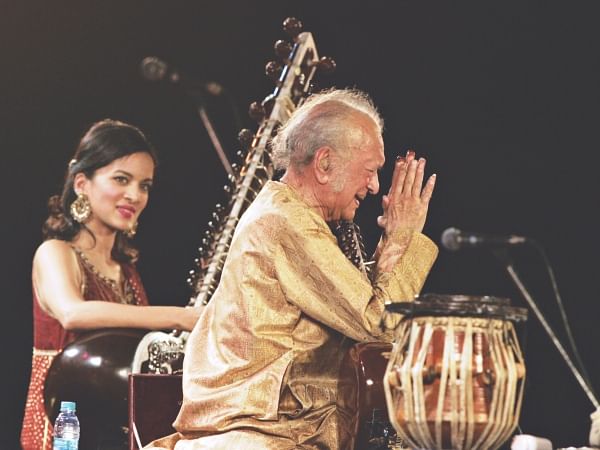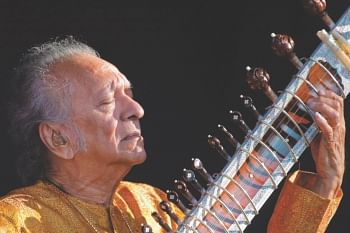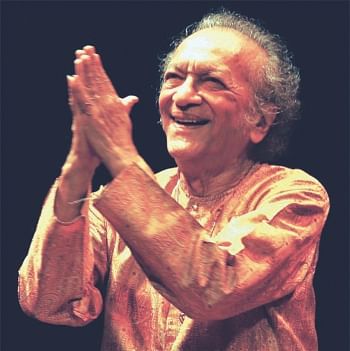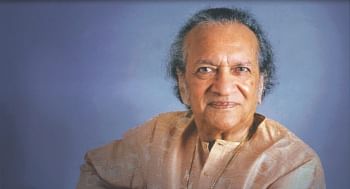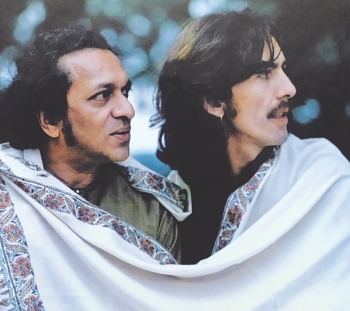| Home - Back Issues - The Team - Contact Us |
 |
| Volume 11 |Issue 50| December 21, 2012 | |
|
|
Tribute END OF A MUSICAL ERA ANIKA HOSSAIN
On Tuesday, the December 11, 2012, a legend breathed his last. The life of sitar virtuoso Pandit Ravi Shankar, whose music transcended cultural barriers, after nearly a century, came to an end. Pandit Ravi Shankar was not only a cultural ambassador for India and “The Godfather of World Music,” as George Harisson described him, he was a composer, a teacher, writer and a pioneering visionary who introduced Indian music to the West. Shankar began his life on 7 April 1920, in Varanasi as Robindro Shankar Chowdhury, born to a Bengali couple Shyam Shankar and Hemangini Devi. His father was a middle temple barrister and scholar who later moved to London to work as a lawyer and remarry, leaving a young Robindro Shankar in the care of his mother. Shankar later adopted and shortened the Sanskrit version of his name to Ravi, which means the sun.
Shankar did not start his career in the performance arts as a sitar player, his interest in the early years was sparked by dance. He was the youngest of seven brothers, and was greatly influenced by them. At the age of ten, he left Varanasi with his brother Uday Shankar who was the choreographer of a dance troupe. By the age of thirteen, he became a member of this troupe and accompanied them on tours during which he learned to play several Indian instruments. He toured Europe and the United States in the early to mid 1930's, where he discovered Western classical music, jazz, he learned French and became fascinated by Western cinema. His career however started to take a more definitive shape when he came across Baba Allauddin Khan at a music conference in Kolkata in 1934. Khan was the lead musician for the Maihar court and one of the most renowned sarodiya, composers and teachers of the 20th century. With the help of his brother Uday, Ravi Shankar toured Europe with Khan where he received some training and an offer to become a full time pupil if he abandoned the tour and returned to Maihar with Khan. In 1938, Shankar moved to Maihar to study Indian classical music under Khan who trained him to master the sitar and surbahar. He also learned the ragas and various styles of music such as the dhamar, khyal and dhrupad. Alongside the sitar, Shankar also learned to play the veena, sursingar and the rubab. His fellow pupils were Khan's son Ali Akbar Khan and daughter Annapurna Devi who became Shankar's first wife and bore him his son Subhendra Shankar in 1942. After completing his training with Khan, Shankar moved to Mumbai in 1944 where his musical career began. He joined the Indian People's Theatre Association and composed music for ballets. He recorded music for HMV India and worked as a music director for All India Radio in New Delhi. Shankar also founded the Indian National Orchestra where his compositions were a combination of Western and Indian instrumental classical music. Among his famous works were the music he composed for Satyajit Ray's Apu Trilogy and his music direction in Bollywood films Godaan and Anuradha. He toured the United Kingdom, Germany and the United States, where he performed for small audiences and educated them about Indian music, integrating ragas from the South Indian Karnataka in his compositions. His first LP album, The Three Ragas was recorded in London and released in 1956. Shankar soon became the first Indian to compose music for non-Indian films. In 1962, he founded a musical institution known as the Kinnara Music School in Mumbai, he later established a branch of this school in Los Angeles, California, in May 1967. During those years, Shankar met George Harrison of The Beatles, who at the time was interested in Indian classical music. Harrison bought himself a sitar and used it to record some songs, and other western musicians followed suit, creating the raga rock trend. Harrison visited India to learn sitar under Shankar and this association increased the sitar maestro's popularity even more, worldwide. In 1968, he published an autobiography titled My Music, My Life. Harrison and Shankar's collaboration in music has a special significance for Bangladeshis, as the duo had organised benefit concerts under the title “The Concert for Bangladesh,” in 1971, in Madison Square Garden in NYC to raise funds for victims and refugees from our country who were taking shelter in India during our Liberation War. The duo worked together to release more albums and toured North America.
In 1992, when Shankar underwent angioplasty due to heart problems, Harrison decided to involve himself in many of his friend's projects. Among these was Shankar's second autobiography, Raaga Mala, which Harisson himself edited. During the late 1990's, Shankar was performing between twenty five to forty concerts a year and teaching music as a Regent's Lecturer at the University of California, San Diego. From 1986 to 1992, Shankar put his politics into practice as a member of India's upper house of parliament, the Rajya Sabha, or state assembly, serving with India's current Prime Minister Manmohan Singh. His extraordinary achievements in his musical career earned him the position of one of the top sitar players in the second half of the twentieth century. He received countless awards and honours, some of which include the Silver Bear Extraordinary Prize of the Jury at the 1957 Berlin International Film Festival for composing the music for the movie Kabuliwala, the Sangeet Natak Akademi Award for 1962, and was named a Fellow of the academy for 1975. He also received the Padma Vibhushan in 1998, Bharat Ratna in 1999, the music award of the UNESCO International Music Council in 1975, three Grammy Awards, and was nominated for an Academy Award. Shankar was awarded honorary degrees from universities in India and the United States. He was also awarded France's highest civilian honour, the Knight of the Legion of Honour. After his death, Grammy has announced Pandit Ravi Shankar as a recipient of the lifetime achievement Grammy. In his personal life, Shankar was a man of controversy. He fathered three children, with three women with whom he had fallen in love. His son with Annapurna Devi, played the sitar and surbahar and often accompanied his father on tours. He passed away in 1992. After his separation from his wife, Shankar had an affair with a concert producer in New York, Sue Jones and fathered Norah Jones, who is a successful musician. After his relationship ended with Sue Jones, Shankar married Sukanya Rajan, in 1989. He had known Sukanya since the 70's had fathered his youngest daughter Anoushka Shankar with her in 1981. Although Shankar had a close relationship with his youngest daughter, his relationship with his eldest, Norah, was distant. He was said to have borne some regrets in regards to this and tried to rebuild his relationship with her when she turned 18. Anoushka followed in her father's footsteps and under his tutelage, is a sitar virtuoso in her own right. She was nominated in 2003 and again in 2013 with her father for the Grammy Award for Best World Music Album. She describes her relationship with Shankar as a very close and loving one. In 2002, she had released a book about her father, called “Bapi: Love of My Life.” It was with this beloved daughter that Shankar performed on 4 November 2012, at the Terrace Theatre in Long Beach California. This was his last public performance. Pandit Ravi Shankar's death marks the end of a remarkable musical era.
Copyright
(R) thedailystar.net 2012 |
